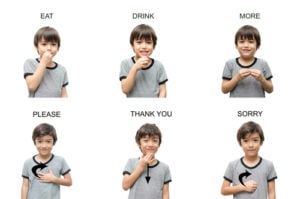 Approximately 7 percent of the world’s population has some kind of hearing loss. The majority are born with normal hearing, becoming deaf later in life.
Approximately 7 percent of the world’s population has some kind of hearing loss. The majority are born with normal hearing, becoming deaf later in life.
About 2 to 3 out of every 1,000 children are born with a detectable level of hearing loss in one or both ears. More than 90 percent of deaf children are born to hearing parents, and less than 10 percent are born to deaf parents. Deaf people born into deaf families are called “Deaf of Deaf”.
Deafness can be genetic, and if deaf people marry, the recessive gene can create families with several generations of deaf people, including deaf aunts, uncles, cousins, and grandfathers. Some children are born hearing in these families, some are hard-of-hearing, but most are born profoundly-deaf.
Research studies
Edublox clinics offer multisensory cognitive training, aimed at developing and automatizing the foundational skills of reading, spelling, Mathematics and the learning of subjects such as History and Geography. Edublox has a long history of improving the learning and literacy abilities of deaf children.
Already in 1987 Dr. Wynand de Wet did his practical research for a Master’s degree in Educational Psychology at a school for the deaf. The subject of his research project concerned the optimization of intelligence. The group who did Edublox were tutored simultaneously for 27.5 hours between April and August of that year, and showed an increase of 11.625 points in non-verbal IQ scores, from an average of 101.125 to an average of 112.75. The group who did not receive cognitive training showed an increase of 4.625, from an average of 104.25 to an average of 108.875.
In a later research study, headed by Dr. Annalene van Staden at the University of the Free State, sign language strategies were combined with an Edublox program to facilitate literacy. Participants were 60 deaf learners in grade 1 to grade 3. Participants were randomly assigned to an experimental and a control group. There were no significant differences between the two groups in terms of age, nonverbal IQ as well as word recognition and spelling abilities. Marj Arslanian, an Edublox Master Trainer, provided Edublox training to the teachers who would present the year-long, four-times per week literacy program to the experimental group for 45 minutes at a time. The learners in the control group received usual classroom instruction.
The research results demonstrated a significant increase in reading and spelling performance of the deaf learners in the experimental group as compared to the control group who received usual classroom instruction. The significant increase was evident in all three grades.
Edublox in action
Dewald Botha ― in the video below ― was born Deaf of Deaf. Both his parents are deaf as well as his younger brother. Because he was failing English Literacy, Mathematics and Sign Language, Dewald attended a 10 day, 43-hour Edublox course. Watch the video to see the results.
© Edublox
Edublox specializes in educational interventions that make children smarter, help them learn and read faster, and do mathematics with ease. Our programs enable learners to overcome reading difficulties and other learning obstacles, assisting them to become lifelong learners and empowering them to realize their highest educational goals.
.
References:
1.) De Wet, W. (1989). The Optimization of Intelligence Actualization by Using Audiblox. M.Ed. (Psychology) Thesis: University of Pretoria.
2.) Van Staden, A., Badenhorst, M.G. & Esterhuyse, K.G. F. (2008). Die ontwikkeling en evaluering van ’n visuele geletterdheidsprogram vir dowe grondslagfase-leerders met lees- en spellingagterstande. Journal for Language Teaching, 42(1):49-63.
